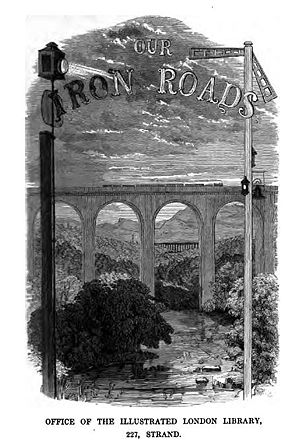
Frederick Smeeton Williams
Encyclopedia

Congregational church
Congregational churches are Protestant Christian churches practicing Congregationalist church governance, in which each congregation independently and autonomously runs its own affairs....
, but is best known for his books on the early history of the railway.
Williams was born in Newark-on-Trent
Newark-on-Trent
Newark-on-Trent is a market town in Nottinghamshire in the East Midlands region of England. It stands on the River Trent, the A1 , and the East Coast Main Line railway. The origins of the town are possibly Roman as it lies on an important Roman road, the Fosse Way...
; his father Charles Williams was also a Congregational minister and a prolific author. He studied at University College and New College in London. His first post in 1857 was at the Congregational church at Claughton, Birkenhead
Birkenhead
Birkenhead is a town within the Metropolitan Borough of Wirral in Merseyside, England. It is on the Wirral Peninsula, along the west bank of the River Mersey, opposite the city of Liverpool...
. From 1861, he lived and worked as a tutor at the Congregational Institute in Nottingham
Nottingham
Nottingham is a city and unitary authority in the East Midlands of England. It is located in the ceremonial county of Nottinghamshire and represents one of eight members of the English Core Cities Group...
, alongside its director John Brown Paton
John Brown Paton
John Brown Paton , English Nonconformist theologian, was born on the 17 December 1830.He was educated at London, Poole and Spring Hill College, Birmingham; he graduated B.A. at the University of London in 1849, and was Hebrew and New Testament prizeman in 1850 and gold medallist in philosophy in 1854...
.
Williams enjoyed a deserved reputation as a pioneer railway historian. "Our Iron Roads" appeared in 1852 and had run to seven editions by 1888, selling over 10,000 copies. The book gives a detailed account of the early history of the railways in Britain and explains at length the construction of embankments, cuttings, tunnels and viaducts. He also wrote "The Midland Railway, its Rise and Progress" (1876), which covers the history of the Midland Railway
Midland Railway
The Midland Railway was a railway company in the United Kingdom from 1844 to 1922, when it became part of the London, Midland and Scottish Railway....
and also describes the countryside and historic sites that were made more accessible by its construction.
He also wrote a book on astronomy, "The Wonders of the Heavens" (1862), and "Nottingham Past and Present" (1878), in addition to several religious pamphlets.

